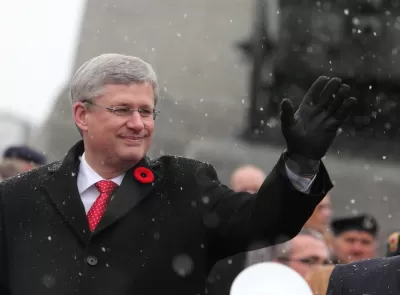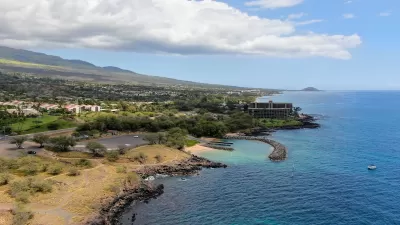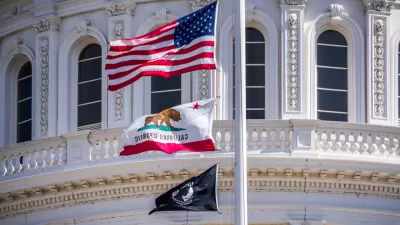There are similarities between the policy actions of former Prime Minister Stephen Harper's Conservative government and the nascent Trump Administration. The differences in approach between these two examples are also telling.

The news so far regarding to the Trump Administration's approach to environmental policy has been unsurprising, but alarming nonetheless.
In one week, news leaked of the administration's plans to freeze grants at the U.S. Environmental Protection Agency. Andrew Revkin and Jesse Eisinger reported on the freeze, as did Katie Sheppard. Brad Plumer followed with an explainer post that provides additional information about EPA grants.
The Trump Administration will include former Oklahoma Attorney General and devout climate change denier Scott Pruitt, who has been tapped to lead the EPA. Planetizen correspondent Irvin Dawid has provided continuing coverage of the implications of that choice by President Trump.
The Trump Administration has also removed all climate change information from the White House website and shut down the Twitter handle of Badlands National Park for tweeting climate change research.
For those looking for some precedent to these anti-environmentalist actions, look no farther than the U.S.'s neighbor to the north, Canada. An article by Sarah Zhang takes a look at Stephen Harper, who served as the prime minister of the Canadian government from 2006 to 2015.
According to Zhang, under Harper, "the Canadian government routinely prevented scientists from talking to the media, while downplaying the effects of climate change."
The climax in what some have called Canada’s war on science was Bill C-38, a 2012 budget bill that stealthily stripped away environmental protections and cut funding at research institutes around the country. Government scientists lost their jobs, and monitoring stations shut down.
What stemmed the tide of anti-environmentalist action in Harper's Canada? Protests, and lots of them. To get more perspective on Harper's policies, and how they might inform an understanding of the actions of the Trump Administration, Zhang speaks with Chris Turner, a Calgary-based environmental journalist and author of The War on Science: Muzzled Scientists and Wilful Blindness in Stephen Harper’s Canada.
FULL STORY: Looking Back at Canada's Political Fight Over Science

Alabama: Trump Terminates Settlements for Black Communities Harmed By Raw Sewage
Trump deemed the landmark civil rights agreement “illegal DEI and environmental justice policy.”

Study: Maui’s Plan to Convert Vacation Rentals to Long-Term Housing Could Cause Nearly $1 Billion Economic Loss
The plan would reduce visitor accommodation by 25% resulting in 1,900 jobs lost.

Planetizen Federal Action Tracker
A weekly monitor of how Trump’s orders and actions are impacting planners and planning in America.

Waymo Gets Permission to Map SF’s Market Street
If allowed to operate on the traffic-restricted street, Waymo’s autonomous taxis would have a leg up over ride-hailing competitors — and counter the city’s efforts to grow bike and pedestrian on the thoroughfare.

Parklet Symposium Highlights the Success of Shared Spaces
Parklets got a boost during the Covid-19 pandemic, when the concept was translated to outdoor dining programs that offered restaurants a lifeline during the shutdown.

Federal Homelessness Agency Places Entire Staff on Leave
The U.S. Interagency Council on Homelessness is the only federal agency dedicated to preventing and ending homelessness.
Urban Design for Planners 1: Software Tools
This six-course series explores essential urban design concepts using open source software and equips planners with the tools they need to participate fully in the urban design process.
Planning for Universal Design
Learn the tools for implementing Universal Design in planning regulations.
Caltrans
Smith Gee Studio
Institute for Housing and Urban Development Studies (IHS)
City of Grandview
Harvard GSD Executive Education
Toledo-Lucas County Plan Commissions
Salt Lake City
NYU Wagner Graduate School of Public Service





























